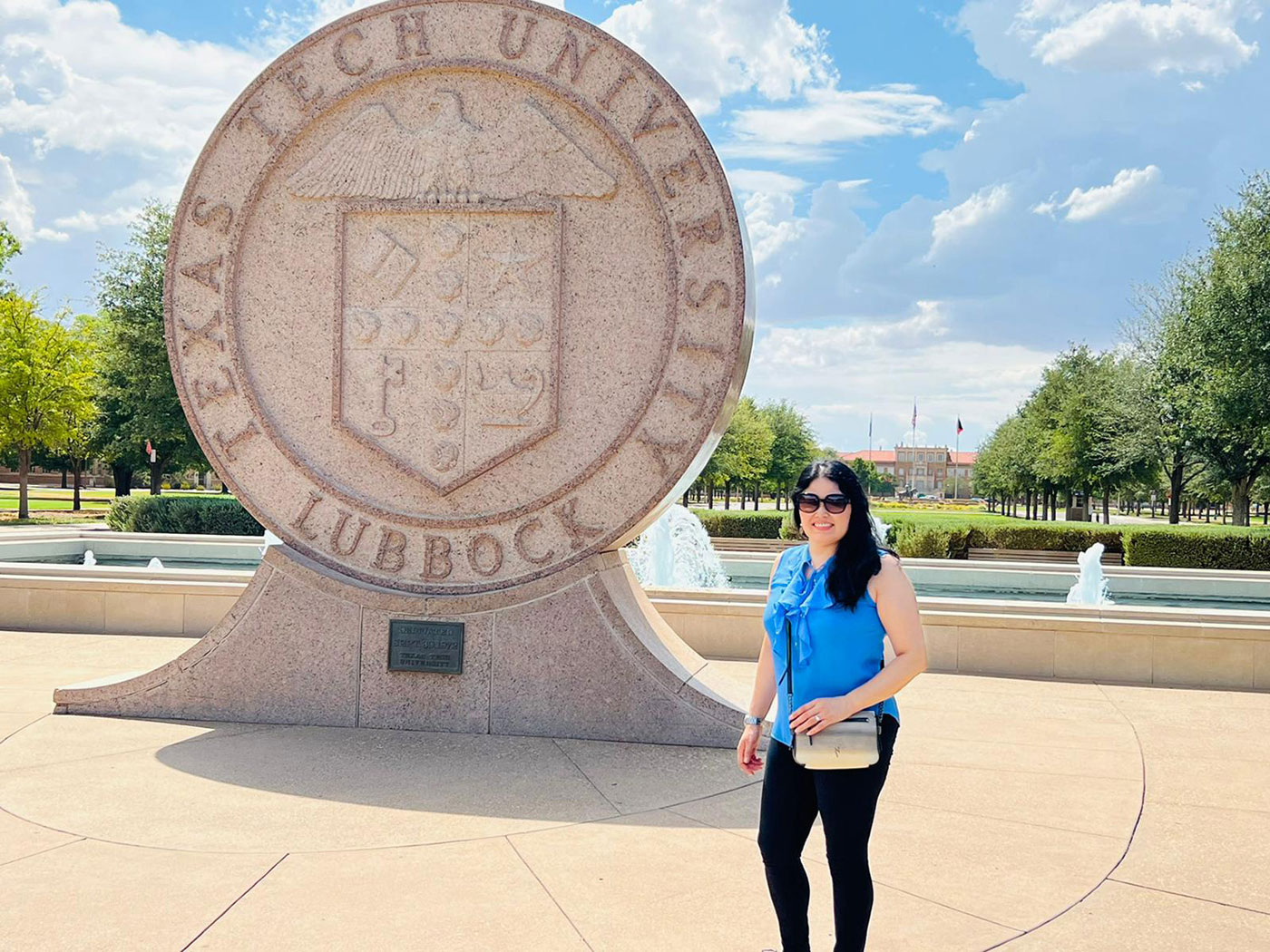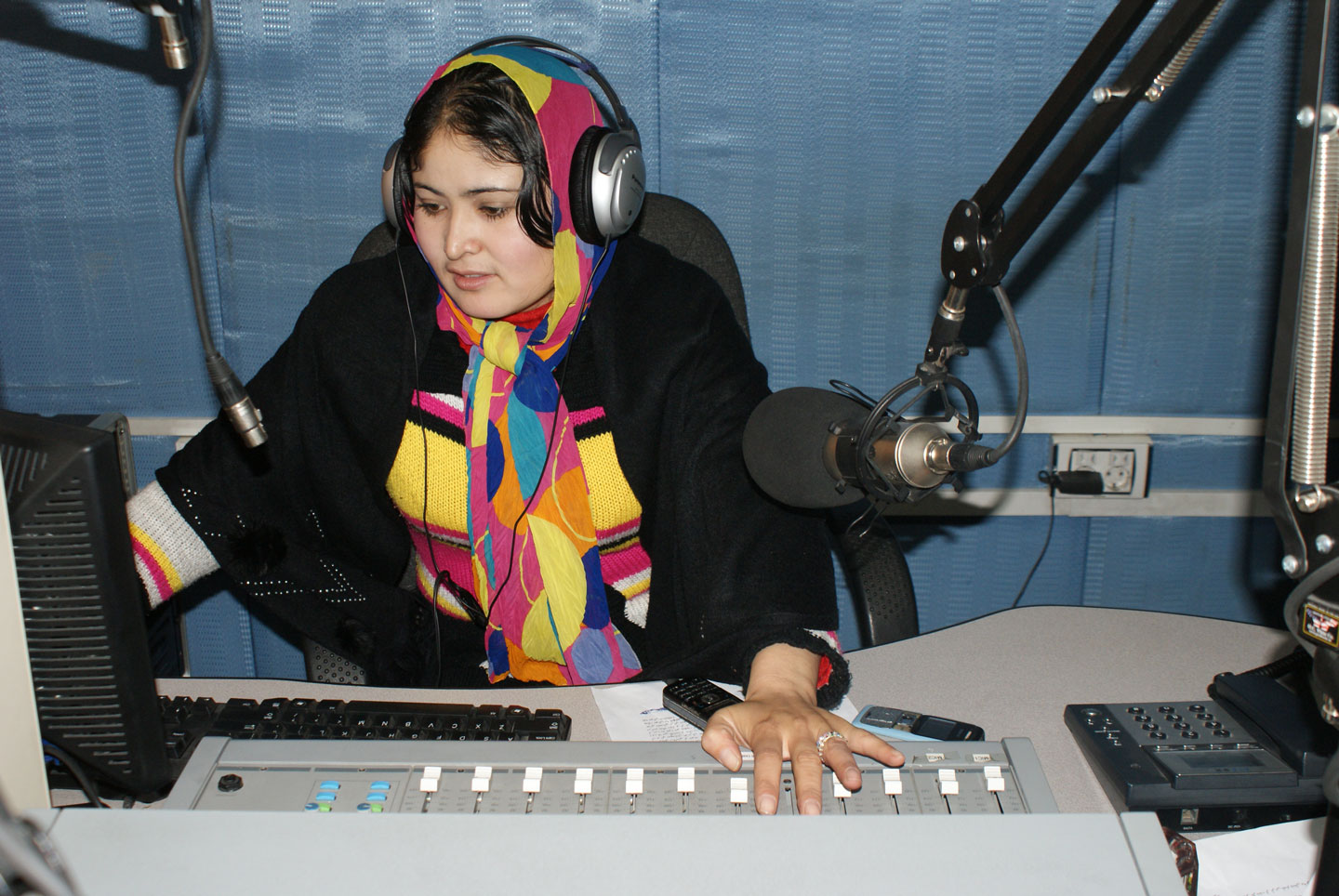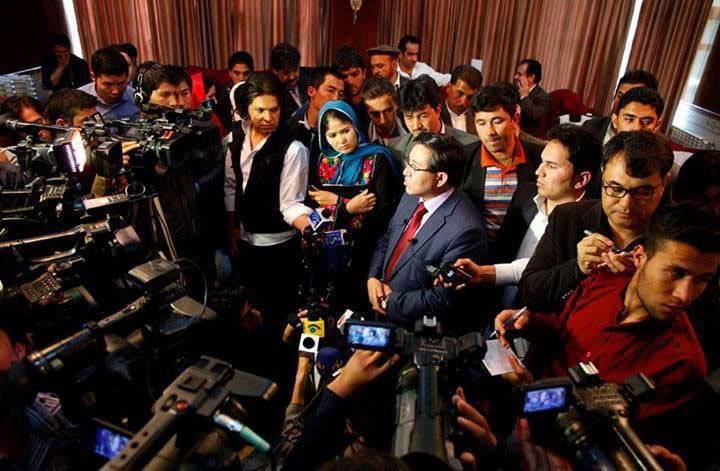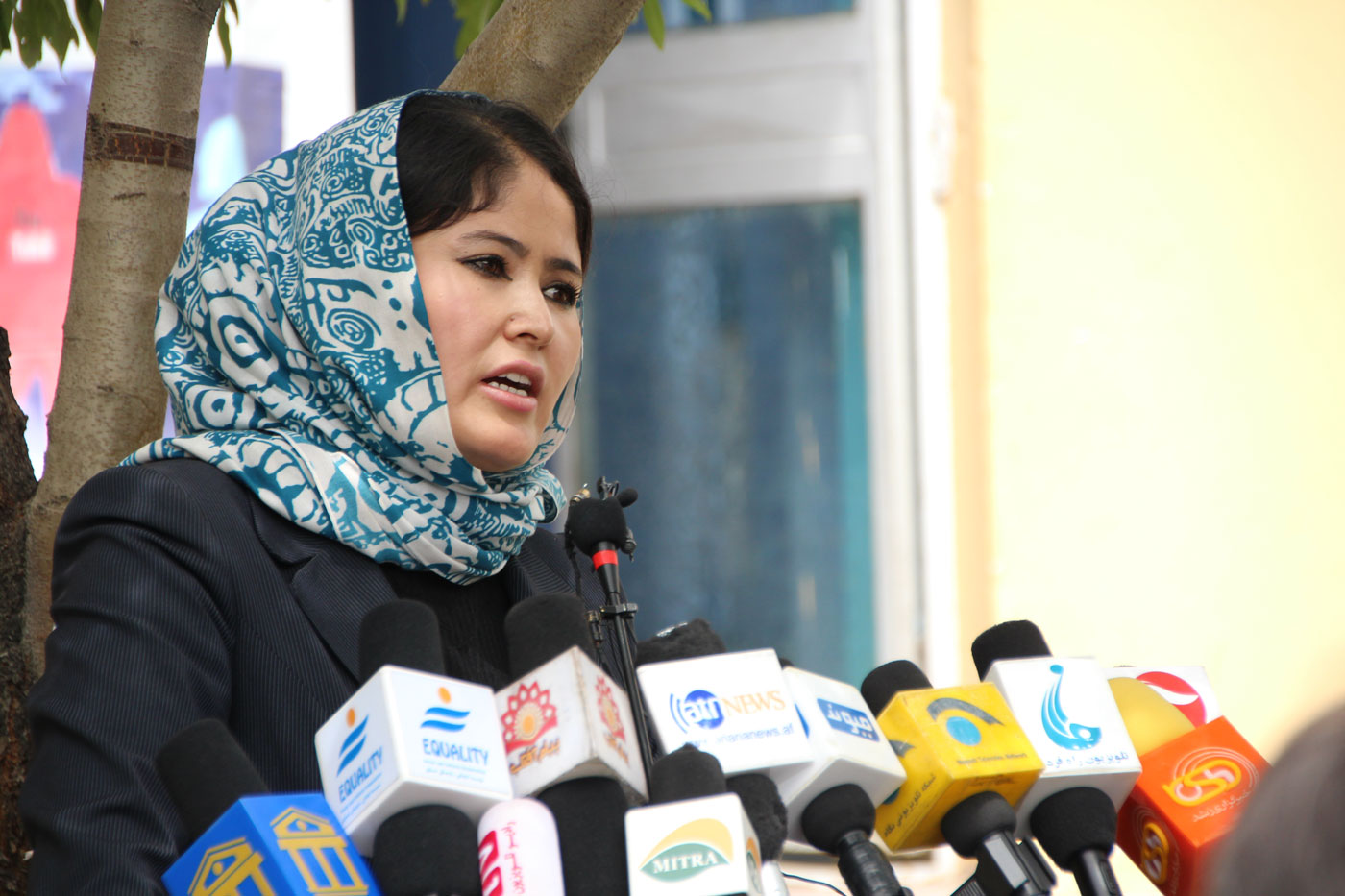Saleha Soadat is conducting research that tells the untold stories of female Afghani journalists.
Saleha Soadat’s life has played out in Kabul, Afghanistan.
It’s where she entered the world, dodged gunfire and went to school for the first time at 18 years old.
She went to college.
She studied journalism.
She became a reporter.
Then, her setting changed.
She now attends Texas Tech University.
She came here one year ago, dodges students zooming by on scooters and bicycles, and started graduate school at 38 years old.
In many ways, she is like other students, struggling with a specific thesis topic and studying for exams. But Saleha can’t go home on break and cannot visit her family. If she does, the Taliban will find her.
She’s on their hit list.
1984
Saleha was born in a war zone.
It was the fifth year of the Russo-Afghan war. A major Soviet-led offensive overran a valley north of Kabul that had been an Afghan guerrilla stronghold for years. Bombings followed a major clash between Soviet troops and rebels during April of 1984, in which the rebels sustained heavy losses. The subsequent Soviet retaliation reportedly sent several thousand people fleeing over the border into Pakistan.
Afghanistan had not always been marked by war. After becoming an independent nation in 1921, the country was relatively stable for decades. It boasted luscious vegetation and peaceful mountains, and women walked throughout the city unrestrained.
The 1970s brought heightened conflict to Afghanistan and much of the world. Political strife found its way over the mountains and into the fabric of Afghan society. American Ambassador Adolph Dubs was killed in 1979, an event that led the U.S. to cut off support.
A short time later, the USSR invaded Kabul. The unwelcome presence of the Soviets sparked a response from Mujahadeen rebels, a national group outraged by the presence of foreign invaders. The rebels were met with a crippling blow. One million Afghanistan civilians were killed in the nine-year conflict, leaving them scattered and fearful by the 1990s. It was during this time of lawlessness that the Taliban rose to power.
This is the Afghanistan Saleha grew up in, one of civil war, poverty, fear, and a complete lack of human rights.
Saleha grew up with two brothers and six sisters. Her brothers attended school, and the girls stayed home with their mother. Saleha’s parents were kind and forward-thinking, as are most Hazara people. They encouraged their daughters to learn.
Under the Taliban, strict Islamic law was in place. Women were required to cover themselves from head to toe and could not leave their homes without a male escort. Any deviation from these laws resulted in beatings at best or death by stoning at worst.
“Perhaps if I had been a boy,” she said, “things would have been different.”
In addition to gender-based violence, Saleha is a target for belonging to the Hazara ethnic group. The Taliban is largely made up of the Pashtun people, and their rulers have come to power through the genocide of the Hazaras.
If you survived ethnic cleansing, you were left as a vulnerable second-class citizen.
“We were prisoners in our own homes,” she said.
While some husbands and fathers used the law to prop themselves up by tearing their wives and children down, Saleha’s father hoped for a better future for his children. He knew an education was their best chance. He spent his evenings teaching his daughters how to read and write. Saleha quickly took to pen and paper, finding a world into which she could escape.
“Girls didn’t have choices,” she said. “But when I wrote, it gave me choices over what I put on the page.”
Saleha was temporarily liberated every night as she read stories and wrote some of her own. Even then, her family had to be cautious of what books they kept in their home. The Taliban had banned mass media, music, books, and any form of entertainment they considered haram or “forbidden.”
While some stories transported Saleha, others brought her back to reality. When a newspaper crossed her threshold, she saw articles about war, politics, power and greed. What struck her, though, was what she didn’t see.
“There were never women in the media,” she said. “It was as if we’d been erased.”
2023
39-year-old Saleha opens the local newspaper in Lubbock, Texas, home of Texas Tech University. She pours herself a cup of coffee and looks over the articles.
Texas Tech football and the annual corn maze hold real estate on the front page. She skims down and sees a story about a female actress.
The woman is in a dress with bare arms, her hair expertly styled.
“American and Afghan news coverage is very different,” Saleha said.
Saleha wonders what is on the front page of the Daily Outlook Afghanistan and Kabul Times today. She wonders about a lot of things back home. How is her sister? Is she safe? What happened to her prized white Mitsubishi SUV? Does a member of the Taliban now drive it?
She makes her way to her first class at the College of Media & Communication. Her body is on campus, but her heart is back home.
“It’s hard not to think about it,” she says. “To wonder if I’ll ever go home.”
Summer break has ended, and many of Saleha’s peers are returning from vacation. They sport tans and new profile pictures. Some mention a brief summer fling. Saleha spent her summer in Chicago and Virginia gathering hundreds of transcripts from interviews with refugees, specifically female journalists from Afghanistan.
She is documenting stories that will be used in her master’s thesis and, ultimately, her book. Leyombe Eko is her thesis adviser; he is reviewing the many interview transcripts Saleha produced over the summer.
“Texas Tech is very lucky to have Saleha,” Eko said.

Eko is a William S. Morris Professor in Innovation, Journalism and Information at the college. He researches freedom of speech and expression. Eko is no stranger to journalistic persecution; he grew up and began his career in Cameroon, where he saw extreme brutality exacted against journalists.
A colleague of Eko’s from Nigeria published an article criticizing the community’s garbage routes – he was killed the next day by a mail bomb. Eko eventually made the transition to academia. Upon arriving at Texas Tech, he founded the Excellence in International Journalism and Human Rights Award, which the college presents to two international female journalists each year.
When Saleha applied, Eko and other faculty knew she would be invaluable to the college, and they hoped the college might be invaluable to her.
“Saleha struck me as a survivor the first time I met her,” Eko says.
Eko’s office is adorned from floor to ceiling with artifacts from around the world, including golden statues, tribal masks and antique cameras. One shelf holds a bright blue ceramic depiction of Buddha.
“The first time Saleha walked into my office, she stared at that Buddha head,” Eko recalls. “There was a famous Buddha carved in rock in Afghanistan during the sixth century, a beautiful piece of anthropological history.”
The Taliban demolished the statues in 2001.
There have been many moments like this since Saleha arrived at Texas Tech. Despite the culture shock, she stays resolute in completing her research and publishing her book.
“That book will give a lot of women their voices back,” Eko says.
2001
Autumn had just begun to hint at its arrival, the days dropping from exhaustive temperatures. A breeze was coming off the mountains, but Saleha couldn’t enjoy it inside. She and her sisters sat around weaving rugs; a way they helped the family make ends meet.
Saleha examined the back of the rug in front of her. It’s complex and, frankly, unattractive stitches bolted every which way. She knew the other side would come out beautifully, but she never appreciated the mess behind it.
Saleha was now a young woman of 17. She couldn’t walk to the bread stand like she did as a child. Some fates were worse than being caught in gunfire.
She and her sisters worked on their rugs; the afternoon slowly ticked on.
It was 4:16 p.m. Her brothers would arrive home soon, and her mother’s attention would move from weaving to cooking. As afternoon slipped into evening, her father arrived home unsettled. There was a shift in the air, the people, the murmurs on the streets.
The family had no electricity or internet. Saleha’s father, however, had an old radio he kept in the house. An artifact from a different time.
He turned the old machine on, careful to keep the volume low, and tuned into the BBC.
Coordinated terrorist attacks had been carried out by al-Qaeda, an Islamist extremist group, destroying two iconic American skyscrapers.
The family sat in silence.
“We were shocked,” she said.
Her family knew the Taliban’s brutality firsthand but realized the national conflict had become a global nightmare. The Taliban had close ties with al-Qaeda and provided them a haven, allowing them to launch this terrorist attack from Afghanistan soil.
Sleep came slowly that night as they wondered what would happen next.
In the months that followed, Saleha remained indoors but for different reasons. The U.S. launched air strikes after the attacks of Sept. 11, and Afghanistan fell into complete chaos. While it was frightening for Afghan civilians, there was simultaneously a faint sense of hope. They shared a common enemy with the U.S.; if they could survive the backlash, there might be freedom on the other side.
Each airstrike pushed the Taliban further into retreat, leaving northern Afghanistan first and then pulling out of other provinces. Eventually, they went into hiding.
Saleha and women across the country came out of their homes. They walked to the stores. They replaced burqas with less restrictive hijabs.
Eventually, girls returned to school. Saleha remembers her first day.
“It was the best day of my life,” she recalled.
After her entrance exam, Saleha started in upper secondary school, the equivalent of high school. She excelled in her studies, consuming knowledge faster than instructors could feed it.
“It felt like a dream,” she said. “On my first day, I walked up to the school and lay my hands on the wall just to make sure it was real.”
2010
Saleha graduated from Kabul University with a degree in journalism, not a popular choice for women. While women were allowed into university and the workforce, culturally intolerant attitudes still posed a threat. The Taliban were in hiding, but their influence left a potent patriarchal culture behind.
“My parents were concerned when I told them I was going to be a journalist,” Saleha said.
Her parents knew she was choosing a dangerous career. They also knew their daughter; if she had made up her mind, there was little point in trying to stop her.
Her parents’ fears were well-founded. Saleha was met with hostility at almost every turn. It was common for men to walk up to her, yelling at her to go home and threatening her if she didn’t.
Due to the threats, Saleha decided to start her career as a reporter on the radio.

“I thought it would be better if people didn’t know what I looked like,” she said.
Saleha eventually made the move to broadcast news, not because it was safe but because she wanted to show the same bravery she asked of the women she interviewed.
“It was a risk I had to take if I wanted others to trust me with their stories,” she said.
Saleha worked at TOLOnews, the largest news station in the country. She became one of two highly respected and recognized female journalists in Afghanistan. For anyone who paid attention to the news, Saleha was a household name. She covered current affairs, politics, finance and human rights.
Her rise to the top did not go unnoticed.
She was named Journalist of the Year by the Afghanistan Senate in 2013, Best Reporter by the Afghanistan Parliament in 2014, and a peace reporter by the U.S. Institute of Peace that same year.

Achieving peace though, sometimes meant sacrificing her own.
One evening in 2012, Saleha’s phone rang as she finished work for the night. Her phone had been going off with interview requests. Sometimes with friendly voices on the other line, other times angry citizens.
That night, the voice on the other end of the line was neither.
It was the voice of a young woman, quiet and cautious.
“Is this Ms. Soadat with TOLOnews?”
“Yes, it is.”
Silence.
“Can I do something for you?”
More silence.
“Hello?”
“I need your help.”
2021
Abbas Changezi opened the home page of BBC News on his computer, pouring a cup of coffee in the kitchen of his Chicago apartment.
It was early summer, and things in Afghanistan were getting worse.
The Afghanistan native follows news in the Middle East closely. It’s a hard habit to break after working for the U.S. Agency for International Development (USAID) projects in Kabul for more than a decade. Abbas moved to Chicago in 2015 after realizing a Taliban resurgence was only a matter of time.
The U.S. remained in Afghanistan longer than he expected, but as his eyes scanned the lines of the morning news, he knew the eventuality had become reality. All signs pointed to a Taliban takeover, and journalists, especially female journalists, would be in grave danger.
Abbas worked as a journalist and news editor for Daily Outlook Afghanistan before his career with USAID. He and Saleha met on the job. Abbas was struck by the young journalist’s work ethic and professionalism. Abbas recalls sitting in the newsroom years ago, asking Saleha how she managed the deluge of men who didn’t want her around.
“Saleha was focused on stories that needed to be told,” he said. “Anyone who got in the way was a distraction, and she didn’t pay attention to distractions.”


Miles away, as Saleha opened an email from Abbas, the gravity of her situation hit her anew.
“I wanted to stay and do my job,” Saleha said. “But as the Taliban rapidly gained control throughout the country, my concerns intensified.”
Abbas urged Saleha to leave as soon as she could, but she wasn’t leaving alone.
Saleha assembled an informal group of female journalists. The group aimed to get all 10 women out of Afghanistan.
Abbas composed a letter for Saleha and the 10 other journalists, for submission to foreign embassies, including Britain, France, Canada and the U.S. These letters meticulously outlined the ongoing turmoil in Afghanistan and the imminent risks they faced if not evacuated promptly. But the situation was not yet that bad in Kabul, so they didn’t get a response.
The home Saleha loved was disappearing with every advance the Taliban made. Saleha’s last hope was President Ashraf Ghani taking military action. He did not.
The Taliban entered Kabul on Aug. 15, 2021. Men cradling automatic weapons perched on top of military vehicles, like vultures ready to scavenge.
Saleha departed for the bank that morning, intending to withdraw cash. The walk was an eerily quiet one. Citizens holed up in their homes, businesses and shops closed, and only a few people scattered throughout the streets.
As Saleha turned the corner, though, she came upon a large, restless crowd. Hundreds of citizens had converged upon the bank. Saleha realized withdrawing money was a hopeless cause and retreated.
“As I neared home, I saw men with unkept hair and guns in front of my house,” she said.
A flash of the Taliban’s infamous black and white flag brought harrowing memories back to life. Suddenly, she was a child again, watching the Taliban beat her brother in front of her family.
Saleha rushed inside her house and told her mother what was happening.
“What will you do now?” her mother asked. “The Taliban will kill you.”
“How do I decide between risking them finding me and leaving my family?” Saleha despaired.
“You don’t,” her mother answered. “You flee.”
2012
The voice on the other end of the line spoke up a little louder.
“I need your help,” the woman said again.
“What’s happened?” Saleha asked.
“I was raped.”
Saleha took a full report from the woman. She lived in the Takhar province and had been sexually assaulted by a local commander. Her case languished in the judicial system because of the commander’s position of power. Bribes and threats cut down the case until it was all but buried.
The survivor knew going to the media would put her at even more risk, but she was out of ideas. When Saleha learned about the case, she began an investigative report. As she delved deeper into the matter, she began receiving death threats.
“It started with phone calls,” she said, “silence and then a voice telling me to drop the story.”
Phone calls escalated to stalking and even threats against Saleha’s family.
While affected, she remained undeterred. She went on national television and sought justice for the survivor. Following the report’s broadcast, Afghan authorities took swift action. The commander was arrested, found guilty and imprisoned.
2021
It was not just the Taliban who would be looking for Saleha. She helped convict many criminals during her time as a journalist. Some for assault, others for embezzlement and corruption. Now that the Afghan democratic system was crumbling, her enemies would be back.
After saying goodbye to her parents and siblings, Saleha fought tears as she gathered what little she could into a backpack.
Before sunrise on Aug. 19, Saleha quietly slipped out her front door and hailed a taxi. She planned to meet another journalist at the airport and together they would board an aircraft. The taxi struggled through anarchic traffic for hours, eventually getting Saleha as close to the airport as it could.
As she approached the front doors, gunfire rang out.
“The sound was deafening,” she recalled.
Several deaths were reported amid the chaotic scene at the airport. U.S. forces had resorted to aerial firing from low-flying helicopters to disperse thousands of Afghan nationals crowding the tarmac.
Saleha and her colleague ran to the doors, where American and Afghan soldiers were processing passengers.
“We pleaded with them to let us in,” Saleha said.
After showing the soldiers their journalist identification, they were finally admitted. Initially relieved, the airport became as much of a prison as it was a shelter.
Saleha spent the night on the floor, surrounded by foul-smelling garbage and the scent of human excrement. There was no food or water, and the sounds of weeping echoed throughout the gates.
The following morning Saleha and her friend were loaded into the cargo bay of a C-17 U.S. Air Force plane. As the steel gray wings lifted them away from danger, they also carried them away from everything they ever knew.

A flight that began with heightened emotions became an exhaustive four-day journey. The plane landed in Kuwait, Bahrain and Bulgaria before departing for the U.S. On Aug. 24, Saleha finally stepped onto U.S. soil. She was sent to a military camp in Wisconsin with other Afghan refugees.
The camp conditions were far from ideal, but Saleha could at least sleep without fear of the Taliban knocking down her door.
Abbas made the drive up from Chicago a few months later.
“It was a cold day in September,” he said. “I remember the changing colors of the leaves on my drive.”
But what stood out most to Abbas most was how little Saleha had on her.
A washcloth, a laptop and her rolled up college degree.
Abbas was Saleha’s mentor and sponsor, and as such, had helped her find accommodations in Chicago. But there was only so much he could do to help Saleha find her way.
Saleha’s life in Chicago was solely dedicated to learning English and deciding what to do professionally. Unfortunately, with such a language barrier, continuing her work as a broadcast journalist was not feasible.
Saleha applied for multiple scholarships and was ultimately chosen by Texas Tech University, which provided educational support for Afghan refugees.
The state department met with Texas Tech President Lawrence Schovanec and then-dean of the College of Media & Communication, David Perlmutter. Everyone unanimously agreed Saleha belonged at Texas Tech.
2023
Saleha moves around the kitchen of her house in Lubbock. She’s cooking kabuli pulao and lamb korma, which reminds her of home. The heater is turned up, which also reminds her of home. In her second year of graduate school, Saleha is working towarda master’s degree in mass communication. She takes classes full-time and works as a research assistant.
Her main focus is authoring a book detailing the role of Afghan women in media from 1919 to 2023. She knows firsthand how the women in her country have carried democracy on their backs. The book gives that recognition while recording history accurately, an academic and societal necessity.
The book will be a historical account as much as it will be a story. Saleha has interviewed more than one hundred journalists, writers and intellectuals, a list that keeps growing. She plans to create a monograph of personal narratives.
“The Taliban wants to erase women,” Eko said. “And in many ways, they’ve been successful. They say it’s about Islam, but I don’t believe it’s religious. This patriarchal group will use anything, including religion, to eradicate women.”
Eko says women are a large threat to men in Afghanistan. Over the last decade, they’ve outperformed men in university entrance exams, which is too much for them to tolerate.
The Taliban went around Kabul in 2021, painting over any public photos or depictions of women, each brush stroke rewinding 20 years of progress. Women are no longer allowed to attend primary school or university, visit the salon or even walk in a public park.
On the darkest days, pregnant mothers and infants are murdered in maternity wards, and little girls are beheaded because they belong to the Hazara ethnic group. The Taliban also hates journalists almost as much as they hate women, and they are merciless if they find the two combined.
Saleha shifts in her chair at the kitchen table, recounting the horrors she reported on while working in Kabul.
“It’s so much worse now,” she says, a far-off look in her eyes.
She has no idea what the future of Afghanistan holds or what will happen to her sister who is trapped there. Saleha’s hands move from her coffee cup to her phone, monitoring her account on X (Twitter), where she regularly shares news from Kabul.
She’ll probably never stop.
“Even though I’m not physically in Afghanistan, my dedication to my fellow Afghans remains unwavering,” she said. “I am a journalist committed to reporting the truth.”
This innate sense of justice drives many journalists forward in corrupt corners of the world. Texas Tech faculty and students like Saleha understand the relationship between journalism and history. In many ways, journalists write history.
“I must tell the story of the women of Afghanistan,” Saleha said, “no matter how brutal that story is to tell.”
Her dark brown eyes glance up from her phone, full of determination, resolved to keep going.
She remains unconcerned with the Taliban’s hit list.
She has her own list to write.
Epilogue
Saleha’s parents were eventually able to evacuate Kabul. Seven of her eight siblings now live outside Afghanistan. She remains concerned for the family who remain there; she has no way to contact them. Saleha left behind her belongings, and most of her assets were frozen. She had to start from scratch upon arriving in the U.S.
Many of the survivors Saleha helped through her investigative career remain in Kabul. They now face retaliation, threats and harassment, unable to leave their homes.
There were roughly 5,000 journalists in Afghanistan in 2020.
Today, there are 39.

